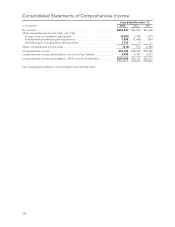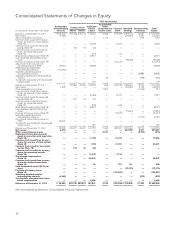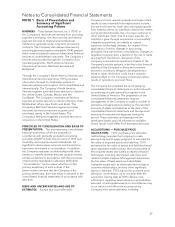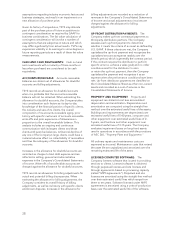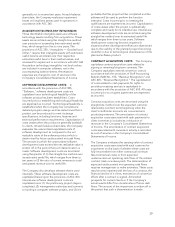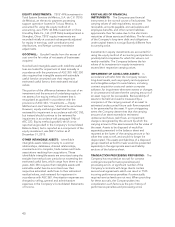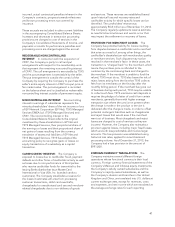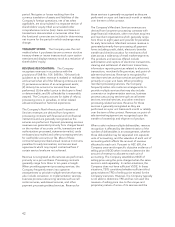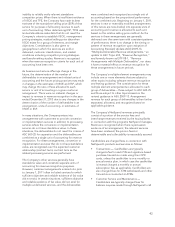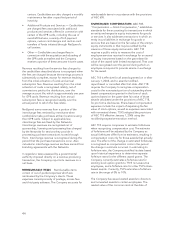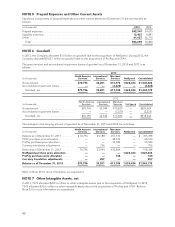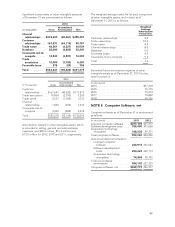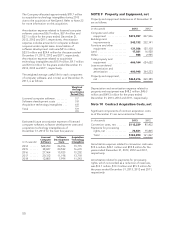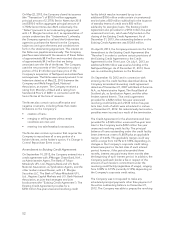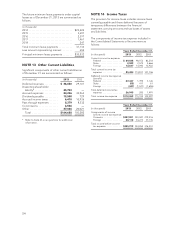NetSpend 2013 Annual Report Download - page 46
Download and view the complete annual report
Please find page 46 of the 2013 NetSpend annual report below. You can navigate through the pages in the report by either clicking on the pages listed below, or by using the keyword search tool below to find specific information within the annual report.centers. Cardholders are also charged a monthly
maintenance fee after a specified period of
inactivity.
• Additional Products and Services — Cardholders
are charged fees associated with additional
products and services offered in connection with
certain of the GPR cards, including the use of
overdraft features, a variety of bill payment
options, custom card designs and card-to-card
transfers of funds initiated through NetSpend’s
call centers.
• Other — Cardholders are charged fees in
connection with the acquisition and reloading of
the GPR cards at retailers and the Company
receives a portion of these amounts in some cases.
Revenue resulting from the service fees charged to
the cardholders described above is recognized when
the fees are charged because the earnings process is
substantially complete, except for revenue resulting
from the initial activation of cards and annual
subscription fees. Revenue resulting from the initial
activation of cards is recognized ratably, net of
commissions paid to the distributors, over the
average account life, which is approximately one year
for GPR cards. Revenue resulting from annual
subscription fees is recognized ratably over the
annual period to which the fees relate.
NetSpend earns revenues from a portion of the
interchange fees remitted by merchants when
cardholders make purchases at their locations using
their GPR cards. Subject to applicable law,
interchange fees are fixed by the Networks.
Interchange revenues are recognized net of
sponsorship, licensing and processing fees charged
by the Networks for services they provide in
processing purchase transactions routed through
them. Interchange revenue is recognized during the
period that the purchase transactions occur. Also
included in interchange revenue are fees earned from
branding agreements with the Networks.
In regards to taxes assessed by a governmental
authority imposed directly on a revenue producing
transaction, the Company reports its revenues on a
net basis.
REIMBURSABLE ITEMS: Reimbursable items
consist of out-of-pocket expenses which are
reimbursed by the Company’s clients. These
expenses consist primarily of postage, access fees
and third party software. The Company accounts for
reimbursable items in accordance with the provisions
of ASC 605.
SHARE-BASED COMPENSATION: ASC 718,
“Compensation — Stock Compensation,” establishes
standards for the accounting for transactions in which
an entity exchanges its equity instruments for goods
or services. It also addresses transactions in which an
entity incurs liabilities in exchange for goods or
services that are based on the fair value of the entity’s
equity instruments or that may be settled by the
issuance of those equity instruments. ASC 718
requires a public entity to measure the cost of
employee services received in exchange for an award
of equity instruments based on the grant-date fair
value of the award (with limited exceptions). That cost
will be recognized over the period during which an
employee is required to provide service in exchange
for the award.
ASC 718 is effective for all awards granted on or after
January 1, 2006, and to awards modified,
repurchased or cancelled after that date. ASC 718
requires the Company to recognize compensation
costs for the nonvested portion of outstanding share-
based compensation granted in the form of stock
options based on the grant-date fair value of those
awards calculated under the provisions of ASC 718,
for pro forma disclosures. Share-based compensation
expenses include the impact of expensing the fair
value of stock options, as well as expenses associated
with nonvested shares. TSYS adopted the provisions
of ASC 718 effective January 1, 2006 using the
modified-prospective-transition method.
ASC 718 requires companies to estimate forfeitures
when recognizing compensation cost. The estimate
of forfeitures will be adjusted by the Company as
actual forfeitures differ from its estimates, resulting in
compensation cost only for those awards that actually
vest. The effect of the change in estimated forfeitures
is recognized as compensation costs in the period
the change in estimate occurred. In estimating its
forfeiture rate, the Company stratified its data based
upon historical experience to determine separate
forfeiture rates for the different award grants. The
Company currently estimates a forfeiture rate for
existing stock option grants to TSYS non-executive
employees, and a forfeiture rate for other TSYS share-
based awards. Currently, TSYS estimates a forfeiture
rate in the range of 0% to 10%.
The Company has issued vested awards to directors
and nonvested awards to certain employees. The
market value of the common stock at the date of
44


